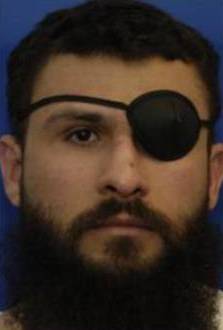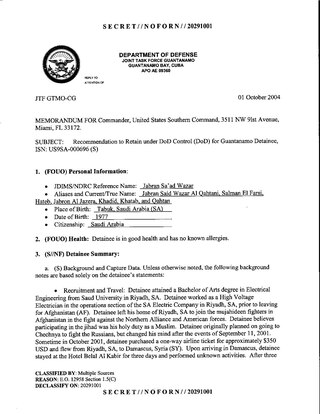Related Research Articles

Abu Zubaydah is a Palestinian citizen born in Saudi Arabia currently held by the U.S. in the Guantanamo Bay detention camp in Cuba. He is held under the authority of Authorization for Use of Military Force Against Terrorists (AUMF).

Waterboarding is a form of torture in which water is poured over a cloth covering the face and breathing passages of an immobilized captive, causing the person to experience the sensation of drowning. In the most common method of waterboarding, the captive's face is covered with cloth or some other thin material and immobilized on their back at an incline of 10 to 20 degrees. Torturers pour water onto the face over the breathing passages, causing an almost immediate gag reflex and creating a drowning sensation for the captive. Normally, water is poured intermittently to prevent death; however, if the water is poured uninterruptedly it will lead to death by asphyxia. Waterboarding can cause extreme pain, damage to lungs, brain damage from oxygen deprivation, other physical injuries including broken bones due to struggling against restraints, and lasting psychological damage. Adverse physical effects can last for months, and psychological effects for years. The term "water board torture" appeared in press reports as early as 1976.

Abd al-Rahim Hussein Muhammed Abdu al-Nashiri is a Saudi Arabian citizen alleged to be the mastermind of the bombing of USS Cole and other maritime attacks. He is alleged to have headed al-Qaeda operations in the Persian Gulf and the Gulf states prior to his capture in November 2002 by the CIA's Special Activities Division.

Omar Amer Deghayes is a Libyan citizen who had legal residency status with surviving members of his family in the United Kingdom since childhood. He was arrested in Pakistan in 2002. He was held by the United States as an enemy combatant at Guantanamo Bay detention camp from 2002 until December 18, 2007. He was released without charges and returned to Britain, where he lives. His Guantanamo Internment Serial Number was 727. Deghayes says he was blinded permanently in one eye, after a guard at Guantanamo gouged his eyes with his fingers. Deghayes was never charged with any crime at Guantanamo.
Bisher Amin Khalil Al-Rawi is an Iraqi citizen, who became a resident of the United Kingdom in the 1980s. Arrested in Gambia on a business trip in November 2002, he was transferred to United States military custody and held until 30 March 2007, in extrajudicial detention in the United States Guantanamo Bay detention camp at its naval base in Cuba. His Guantanamo Internment Serial Number was 906. The Department of Defense reports that Al Rawi was born on 23 December 1960, in Baghdad, Iraq.
Extrajudicial prisoners of the United States, in the context of the early twenty-first century War on Terrorism, refers to foreign nationals the United States detains outside of the legal process required within United States legal jurisdiction. In this context, the U.S. government is maintaining torture centers, called black sites, operated by both known and secret intelligence agencies. Such black sites were later confirmed by reports from journalists, investigations, and from men who had been imprisoned and tortured there, and later released after being tortured until the CIA was comfortable they had done nothing wrong, and had nothing to hide.

Jabran Said Bin Wazir al-Qahtani is a Saudi who was held in extrajudicial detention for almost fifteen years in the United States Guantanamo Bay detention camps, in Cuba. Joint Task Force Guantanamo analysts estimate he was born in 1977, in Tabuk, Saudi Arabia.
Ghassan Abdallah Ghazi al-Sharbi is a Saudi citizen who was held in extrajudicial detention in the United States Guantanamo Bay detention camps, in Cuba. His Guantanamo Internment Serial Number was 682.
Gitanjali S. Gutierrez is an American lawyer. She is the lawyer for the defendant Mohammed al-Qahtani, who is held at Camp Delta in Guantanamo Bay by the United States Military. Gitanjali Gutierrez is an attorney with the Center for Constitutional Rights, a New York–based nonprofit organization.

Musab Omar Ali Al Mudwani is a citizen of Yemen who was held in extrajudicial detention in the United States Guantanamo Bay detainment camps, in Cuba.
Noor Uthman Muhammed is a citizen of Sudan who was confined in the United States Guantanamo Bay detention camp in Cuba where he also served a sentence for terrorism after being convicted by the Guantanamo military commission.
Majid Shoukat Khan is a Pakistani who was the only known legal resident of the United States held in the Guantanamo Bay Detainment Camp. He was a "high value detainee" and was tortured by U.S. intelligence forces.
"Enhanced interrogation techniques" or "enhanced interrogation" was a program of systematic torture of detainees by the Central Intelligence Agency (CIA), the Defense Intelligence Agency (DIA) and various components of the U.S. Armed Forces at remote sites around the world—including Bagram, Guantanamo Bay, Abu Ghraib, and Bucharest—authorized by officials of the George W. Bush administration. Methods used included beating, binding in contorted stress positions, hooding, subjection to deafening noise, sleep disruption, sleep deprivation to the point of hallucination, deprivation of food, drink, and medical care for wounds, as well as waterboarding, walling, sexual humiliation, rape, sexual assault, subjection to extreme heat or extreme cold, and confinement in small coffin-like boxes. A Guantanamo inmate's drawings of some of these tortures, to which he himself was subjected, were published in The New York Times. Some of these techniques fall under the category known as "white room torture". Several detainees endured medically unnecessary "rectal rehydration", "rectal fluid resuscitation", and "rectal feeding". In addition to brutalizing detainees, there were threats to their families such as threats to harm children, and threats to sexually abuse or to cut the throat of detainees' mothers.

El Banna v. Bush, No. 1:04-cv-01144, is a writ of habeas corpus that was submitted on behalf of the Guantanamo captives Jamil al-Banna, Bisher Al Rawi and Martin Mubanga. They were United Kingdom citizens or residents.

Tina Monshipour Foster is an Iranian-American lawyer and director of the International Justice Network.
Rafiq Bin Bashir Bin Jalud al Hami is a citizen of Tunisia, who was formerly held for over seven years without charge or trial in the United States's Guantanamo Bay detention camps, in Cuba. His Guantanamo Internment Serial Number was 892. The Department of Defense reports that he was born on 14 March 1969, in Tunisia.
Noor al-Deen is a citizen of Syria wounded when he was captured by counter-terrorism officials at a raid on a "Faisalabad safe house" when Abu Zubaydah was captured. According to the Washington Post Noor al-Deen, like Abu Zubaydah, was sent to Morocco by the CIA, so he too could be subjected to "enhanced interrogation techniques"
The John Adams Project was established by the American Civil Liberties Union and the National Association of Criminal Defense Lawyers to "support military counsel at Guantanamo Bay." The United States government has detained hundreds of men at the Guantanamo Bay detention camp following the September 11 attacks and the war in Afghanistan.
In 2003, a secret compound, known as Strawberry Fields, was constructed near the main Guantanamo Bay detention camps, in Cuba. In August 2010 reporters found that it had been constructed to hold CIA detainees classified as "high value". These were among the many men known as ghost detainees, as they were ultimately held for years for interrogation by the CIA in its secret prisons known as black sites at various places in Europe, the Mideast, and Asia, including Afghanistan.
According to UN experts, the Guantanamo Bay detention facility in Cuba is a site of "unparalleled notoriety" and has been condemned as a site of "unrelenting human rights violations." The facility has been holding prisoners for over 20 years. A document released by the Amnesty International reported ongoing and historic human rights violations at the Guantánamo Bay detention facility.
References
- ↑ George Brent Mickum IV. "Torturing Decocracy". George Washington University. Archived from the original on 2009-03-12.
Brent Mickum, who has practiced law for 23 years, is a partner with Hollingsworth LLP in Washington, D.C.
- 1 2 "George Brent Mickum". Findlaw . Archived from the original on 2011-06-06.
- ↑ Carol D. Leonnig (2004-12-02). "Judge Questions Sweep of Bush's War on Terrorism". Washington Post . p. A04. Archived from the original on 2016-03-04. Retrieved 2008-06-29.
- ↑ OARDEC (2006-05-15). "List of Individuals Detained by the Department of Defense at Guantanamo Bay, Cuba from January 2002 through May 15, 2006" (PDF). United States Department of Defense. Archived from the original (PDF) on September 30, 2007. Retrieved 2007-09-29.
- ↑ "An Interview with Brent Mickum". Islamic Networking. 2005-03-31. Archived from the original on February 14, 2012. Retrieved 2009-03-07.
{{cite news}}: CS1 maint: bot: original URL status unknown (link) - ↑ "George Brent Mickum IV: Attorney, Spriggs & Hollingsworth". George Washington University. 2007-11-19. Archived from the original on March 12, 2009. Retrieved 2009-03-07.
- 1 2 Vikram Dodd (2004-09-28). "'Backdoor' trials for Britons in Guantánamo: Britons face trials". The Guardian . Retrieved 2009-03-07.
- ↑ Brent Mickum (2005-01-12). "Tortured, humiliated and crying out for some justice: Four Guantánamo Britons are coming home. Don't forget those left behind". The Guardian . Retrieved 2009-03-07.
- ↑ Carol Rosenberg (2008-02-27). "After years, captive sees lawyer". Miami Herald. Archived from the original on May 18, 2008. Retrieved 2008-06-28.
- ↑ "George Brent Mickum IV". Spriggs & Hollingsworth. Archived from the original on 2011-06-06. Retrieved 2008-06-28.
- ↑ Carol Cratty (2008-03-17). "Terror detainee falsely held, lawyers say". CNN . Retrieved 2008-06-29.
- ↑ "U.S. Seeks To Keep Detainee From Lawyer". CBS News . 2006-11-04. Archived from the original on 2011-06-04.
A suspected terrorist who spent years in a secret CIA prison should not be allowed to speak to a civilian attorney, the Bush administration argues, because he could reveal the agency's closely guarded interrogation techniques.
- ↑ "U.S. fights detainee access to attorney". USA Today. 2006-11-04. Archived from the original on 2012-10-26.
- ↑ George Brent Mickum IV (2009-03-30). "The truth about Abu Zubaydah: The Bush administration's false claim that my client was a top al-Qaida official has led to his imprisonment and torture". The Guardian . Archived from the original on 2009-04-01.